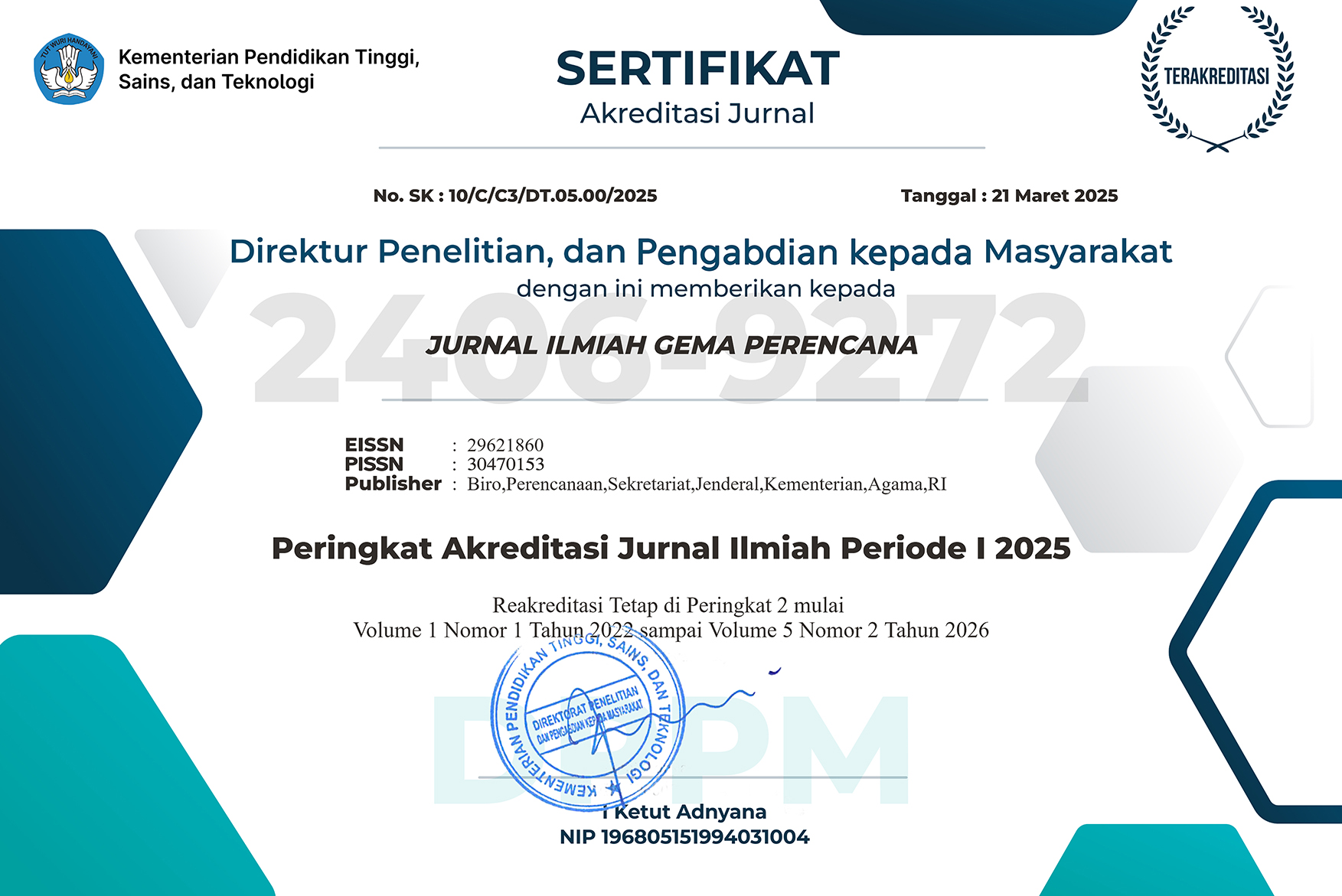Policy Strategy for Increasing the Role of Community Service at STAIN Majene in Community Economic Empowerment
DOI:
https://doi.org/10.61860/jigp.v4i1.237Abstract
This policy paper discusses strategies for enhancing the role of community service at STAIN Majene in local economic empowerment in Majene Regency, West Sulawesi. The background of this study is the low effectiveness of community service caused by the lack of strategic collaboration between STAIN Majene and local economic stakeholders, the absence of specific institutional structures, and the lack of formal operational procedures. This study uses a qualitative method with an evidence-based policy approach to descriptive analysis. Data were collected through literature studies, official document analysis, field observations, and informal interviews with business actors and community leaders. Primary and secondary data were then analyzed using the public policy evaluation framework according to William N. Dunn, which includes six criteria: effectiveness, efficiency, adequacy, equity, responsiveness, and precision. The analysis results show that the establishment of a special external partnership unit under P3M is the most strategic policy alternative, with the potential to drive institutional transformation and strengthen cross-sector collaboration in economic empowerment programs. This policy paper recommends the establishment of such a unit with support from internal regulations, functional organizational structure, digital information systems, and integration into the campus strategic plan. These findings contribute theoretically to the development of a collaborative service model based on Islamic values and local needs, and practically offer an adaptive and inclusive institutional model for PTKIN in underdeveloped regions. With this strategy, STAIN Majene has the opportunity to become a pioneer in transformative, impactful, and sustainable community service practices.
Downloads
References
Amalia, R., & Lestari, E. (2020). Kolaborasi Perguruan Tinggi dan Dunia Usaha dalam Pemberdayaan Ekonomi. Jurnal Pemberdayaan Masyarakat, 5(2), 112-124.
Ansell, C., & Gash, A. (2008). Collaborative governance in theory and practice. Journal of Public Administration Research and Theory, 18(4), 543-571.
BAN-PT. (2023). Instrumen Akreditasi Perguruan Tinggi 9 Kriteria. Badan Akreditasi Nasional Perguruan Tinggi.
Brinkerhoff, J. M. (2002). Government-nonprofit partnership: a defining framework. Public Administration and Development, 22(1), 19-30.
Ismail, M., Sahlan, M., & Karim, R. (2021). Strategi Pengabdian Masyarakat Berbasis Kebutuhan Lokal. Jurnal Abdimas Nusantara, 2(1), 35-45.
Kementerian Agama Republik Indonesia. (2020). Rencana Strategis Kementerian Agama Tahun 2020–2024.
Kementerian Dalam Negeri Republik Indonesia. (2018). Peraturan Menteri Dalam Negeri Nomor 18 Tahun 2018 tentang Lembaga Kemasyarakatan Desa.
Kementerian Pendidikan, Kebudayaan, Riset, dan Teknologi Republik Indonesia. (2021). Peraturan Mendikbudristek No. 30 Tahun 2021 tentang Indikator Kinerja Utama Perguruan Tinggi.
Kementerian Riset, Teknologi, dan Pendidikan Tinggi. (2015). Peraturan Menteri Ristekdikti No. 44 Tahun 2015 tentang Standar Nasional Pendidikan Tinggi.
Morgan, P. (2006). The Concept of Capacity. European Centre for Development Policy Management.
Nugroho, R. (2018). Public Policy: Dinamika Kebijakan, Analisis Kebijakan, Manajemen Kebijakan. Jakarta: Elex Media Komputindo.
Perkins, D. D., & Zimmerman, M. A. (1995). Empowerment theory, research, and application. American Journal of Community Psychology, 23(5), 569-579.
Pratama, I. R., & Wijaya, H. (2018). Penyusunan SOP sebagai Upaya Penguatan Tata Kelola Program Pengabdian. Jurnal Manajemen Publik, 7(1), 44–53.
Putra, H., Lestari, D., & Wulandari, N. (2021). Penguatan Kolaborasi Perguruan Tinggi dan Pemerintah Daerah dalam Pemberdayaan Ekonomi. Jurnal Kolaborasi Pembangunan Daerah, 3(2), 77-91.
Rahman, T., & Surya, Y. (2022). Transformasi Budaya Organisasi di Perguruan Tinggi. Jurnal Pendidikan Tinggi Islam, 6(1), 88–102.
Setyawati, L. (2020). Keterkaitan antara Penelitian dan Pengabdian: Tinjauan Konseptual. Jurnal Ilmu Sosial dan Humaniora, 9(3), 221–230.
Siregar, D., & Hamid, A. (2021). Insentif Akademik untuk Peningkatan Partisipasi Dosen dalam Pengabdian Masyarakat. Jurnal Pendidikan dan Pemberdayaan, 4(2), 114–126.
Sukarno, A., & Putri, M. (2022). Integrasi Pengabdian dalam Penilaian Kinerja Dosen. Jurnal Evaluasi Kinerja Akademik, 5(1), 29–40.
Suryana, T., & Santoso, B. (2019). Tantangan Kolaborasi Perguruan Tinggi dan Dunia Usaha dalam Pengabdian. Jurnal Pengabdian dan Pemberdayaan Masyarakat, 3(1), 10-20.
Undang-Undang Republik Indonesia Nomor 12 Tahun 2012 tentang Pendidikan Tinggi.
Wibowo, H., & Cahyono, A. (2021). Tantangan dan Strategi Kolaborasi Akademik. Jurnal Tata Kelola Pendidikan Tinggi, 5(2), 87–98.
Wiryanto, A. (2017). Penguatan SOP dalam Pengelolaan Program Perguruan Tinggi. Jurnal Administrasi Pendidikan, 2(3), 145–155.
Yusuf, M., & Rachmawati, A. (2020). Ekonomi Syariah dan Pemberdayaan Masyarakat. Jurnal Ekonomi Islam, 8(1), 55-64.
Downloads
Published
How to Cite
Issue
Section
License
Copyright (c) 2025 Pakhri

This work is licensed under a Creative Commons Attribution 4.0 International License.








